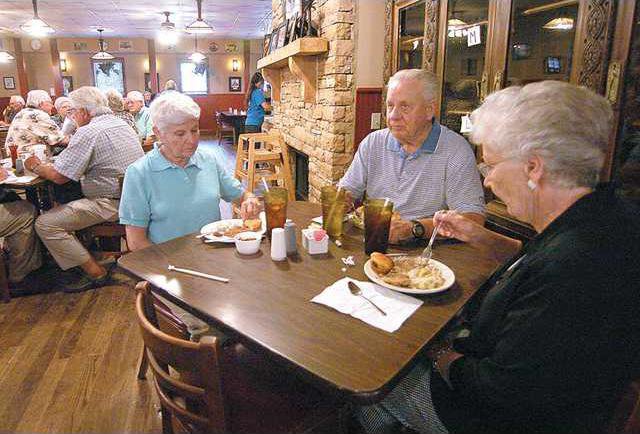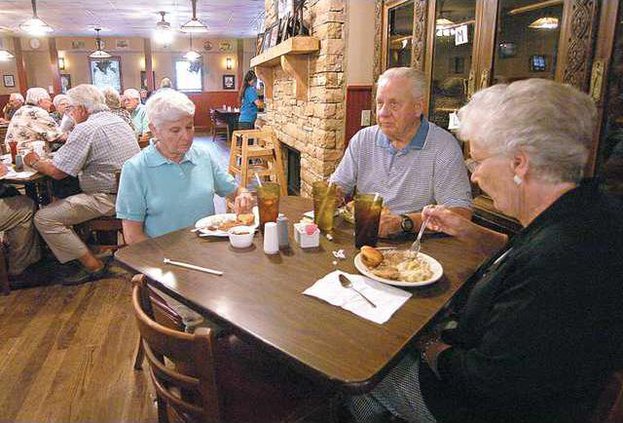More election coverage
New polls boost Deal's odds in tight GOP race
A note to our readers from Executive Editor Mitch Clarke
What are voters thinking about?
The Georgia Newspaper Partnership has identified four policy issues that are likely to dominate the debate in the race for governor, as well as races for Congress and the General Assembly. Over the next few weeks, we’ll be looking at this issues in depth.
Here’s a look at the four topics.
Education: The state’s public school system has been rocked by a cheating scandal, massive layoffs, teacher furloughs and drastic budget cuts. While there have been improvements in some areas, few would say they are satisfied with how Georgia’s K-12 schools have performed.
Transportation: A bill awaiting Gov. Sonny Perdue’s signature has been hailed as the most important piece of transportation legislation in a generation. But most also agree it is not enough. Even if voters in 2012 agree to raise their sales taxes to fund road projects, it will be years after that before a difference is felt.
State budget and economy: The General Assembly just completed work on an austere state budget for the fiscal year that begins July 1. State spending is down more than $3 billion in the past two years alone, and the next governor will inherit an even worse financial picture. Some estimates are that another $1.2 billion in spending will have to be cut in the fiscal 2012 budget.
Immigration: Arizona’s new immigration law has gotten attention, but Georgia has been on the front lines on immigration as well. The topic came up at a May 22 GOP debate, with the four candidates there expressing support for what Arizona has done.
Aaron Gould Sheinin, AJC
Adults need jobs. Children need education. We need stronger borders.
Our politicians? Well, they’d better watch out.
This year’s election season is a big one. In addition to sending state and federal lawmakers to office, voters also will choose a new governor to succeed Gov. Sonny Perdue in the July 20 primary.
It’s not a job for the politically timid. The next governor will take office in a state where the unemployment rate exceeds the national average, where school districts have axed thousands of teachers and where immigration remains a thorny issue.
With that in mind, reporters from The Times and 10 other newspapers from Chattanooga, Tenn., to Valdosta last week interviewed more than 150 residents about their hopes, concerns and priorities for the campaigns.
The reporters’ findings? We’re fretful about the economy, fearful for our schools, frustrated with illegal immigration and fuming at lawmakers.
The issues may be clear to voters, but the candidates aren’t. Less than two months before the primaries, few could name all of the 14 people running for governor. Most voters appeared only vaguely aware that another political season is imminent.
For Butch McIntire, 56, of Flowery Branch, it doesn’t matter which side you vote for “after the way things have been going.”
“The world is in a big mess and spiraling out of control,” he said while eating with Lanier Color Co. co-workers at Loretta’s Country Kitchen in Oakwood. “We were just sitting here talking about that with the oil crisis. People are so passive and don’t want to take a move.”
‘People are losing jobs’
The economic numbers are daunting. Georgia last year lost 94,000 jobs. Its unemployment rate last week stood at 10.4 percent.
The state leads the nation in bank failures.
The solution? Jobs.
Dahlonega resident Bobbi Sutton, 62, could only agree. The Northeast Georgia mountain community enjoyed a revival of small businesses and tourism in the last decade, but the recession left many businesses in the dark, their doors bolted.
“The lawmakers need to get their priorities in order,” said Sutton, who manages Winedog Pet Boutique on the square.
Jack Ferguson, 76, said he has narrowed down who he will vote for governor to two candidates, and it depends on their views about the economy.
“I hope to hear one of them has a fix,” the retired Gainesville man said while eating an early supper at the Longstreet Cafe. “Anything to reduce the deficit.”
Legislators also need to take a hard look at government programs, Lance Linton, 43, of Sugar Hill, said at Loretta’s in Oakwood.
“People are losing jobs and don’t even get enough unemployment to live, and when it runs out, then what?” he asked. “What is the stimulus stimulating, and how many people are benefiting?”
‘Gutting education’
Last week, the state Board of Education voted to lift all limits on class sizes. It was an attempt to bridge a nearly $1 billion gap in school funding. In Gainesville and Hall County, the boards of education sliced left and right: more furloughs, fewer planning days and a shorter calendar year.
The cuts are enough to make Anita Gaile Conner tired of hearing about teachers getting laid off and schools closing.
“I want to see them help our schools,” said the 49-year-old pastry chef. “That should be their main topic. Our children and our schools.”
Conner, a Republican who lives in Cleveland, said it’s enough to keep her from deciding who gets her vote.
“I’m so torn up over what’s happening,” she said. “Is my vote even going to make a difference?”
When Georgia’s students repeatedly perform at the bottom of the nation, the state school system needs “the most qualified person to run it,” said John Lees, 62, of Dahlonega, while eating at Loretta’s. “What if the same number of people showed up for the PTA as the Friday football game? Things would change.”
Make sure students learn the right things, added Augusta resident Dan Cook, 77, a retired advertising executive.
“Teach young people not to just line up behind cash registers,” said Cook, in downtown Augusta. “We need to teach them ... to go after a better kind of job.”
Children may be learning the wrong lesson, said Charles Graves, who is 71 and lives near Rome. The lesson: school is not important to lawmakers.
“We’re gutting education,” he said.
‘No durn business being here’
They may not know her name, but Georgia’s voters know who she is. Jessica Colotl, a Kennesaw State University student facing deportation after officials discovered she has lived in this country illegally for 11 years, is the new face of illegal immigration in Georgia.
“I just don’t think it’s right,” said Bonita Casper, 43, who works as a babysitter in Flowery Branch. “She should become an American citizen. She had ample time to get a visa, so she should be the same as us if she wants our benefits. I had two girls who couldn’t go to college because they couldn’t get the funding, so what do we do when the funding runs out as we spend it on everyone else?”
Sitting with Casper and two girls was Wilma Esco, 74, of Buford, also passionate about immigration.
“If I go to someone else’s country, I follow their rules, so why can’t they?” she said. “I really don’t have anything against anybody.”
Ray Charles Ellis, 55, of Brunswick, threaded a fresh shrimp on a hook and cast it into the East River. Laid off eight months ago, Ellis worries about illegal immigration and its effect on people looking for work.
“There’d be more jobs if we’d get the (illegal immigrants) out of here. If a company hires me, they have to pay me $12 an hour, but they can get two of them for $6 an hour,” he said. “They ... send all their money out back home to Mexico or Indochina where it helps their country, not us.”
McDonough resident Debbie Woods took a similarly hard line. She sells produce at the State Farmers Market, and believes a lot of the workers she sees at the Forest Park facility are in America under questionable circumstances.
“If they’re legal, that’s fine,” said Woods, 52, speaking over the hum of a forklift motor. “If they’re not, they’ve got no durn business being here.”
‘He’s like me’
Gainesville voters are confident in their native sons.
Many residents say they are voting for local candidates Nathan Deal for governor and Lee Hawkins for the U.S. House of Representatives.
Though there are nearly 200,000 people in Hall County, Deal and Hawkins seem to be friends with just about everybody in the area that still feels like a small town.
Mary Beth Begley is a Republican who feels strongly that the candidates from her community will be the best fit for Georgia. Begley, 56, is the owner of The Crystal Plate shop in downtown Gainesville.
“I’m all about Lee Hawkins, Nathan Deal and Butch Miller,” Begley said. “I think Lee has a very fair point of view and I think he will do what’s best for the country.”
Miller won a special election May 11 for Hawkins’ vacant state Senate seat, and also is on the July primary ballot for a full term.
Ray Loggins, who drives horse-drawn carriages in Helen, is hoping the next governor will understand his way of life.
The 70-year-old farmer said he thinks it is important that politicians know what hard work is. He chose not to share who he plans to vote for, but said he thinks the person will represent rural Georgians.
“I saw this candidate work for years, and actually I’ve had him in mind because I think he’s capable of doing the job we need done,” Loggins said. “He’s like me, he’s a country guy. If it weren’t for the country, the city wouldn’t be there.”
New politicians would be nice, said Dalton State College student Casey Hope. He spent a recent afternoon sitting on a bench in Dalton.
“I just want something different,” said Hope, 20. “They’re (incumbents) obviously not doing what they should be doing.”
Rome resident Brian Hampton, 63, wasn’t as pessimistic. The machine, he said, is OK. Perhaps the operators need to be fired.
“We have to get the machinery of government working again,” he said. “It’s just been run badly.”

